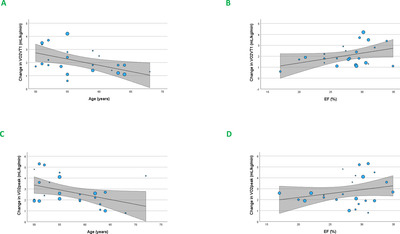Christou, GA;
Christou, MA;
Davos, CH;
Markozannes, G;
Christou, KA;
Mantzoukas, S;
Christodoulou, DK;
Kiortsis, DN;
Christou, PA;
Tigas, S;
et al.
Christou, GA; Christou, MA; Davos, CH; Markozannes, G; Christou, KA; Mantzoukas, S; Christodoulou, DK; Kiortsis, DN; Christou, PA; Tigas, S; Nikoletou, D
(2024)
Ergophysiological evaluation of heart failure patients with reduced ejection fraction undergoing exercise-based cardiac rehabilitation: A systematic review and meta-analysis.
Hellenic J Cardiol, 77.
pp. 109-119.
ISSN 2241-5955
https://doi.org/10.1016/j.hjc.2024.01.004
SGUL Authors: Nikoletou, Dimitra
|
PDF
Published Version
Available under License Creative Commons Attribution Non-commercial No Derivatives. Download (1MB) | Preview |
|
![[img]](https://openaccess.sgul.ac.uk/116016/17.hassmallThumbnailVersion/1-s2.0-S1109966624000046-figs1_lrg.jpg)
|
Image (JPEG) (Supplementary Figure 1)
Supplemental Material
Download (157kB) | Preview |
|
|
Microsoft Word (.docx) (Supplementary File)
Supplemental Material
Download (16kB) |
||
|
Microsoft Word (.docx) (Supplementary Table 1)
Supplemental Material
Download (18kB) |
||
|
Microsoft Word (.docx) (Supplementary Table 2)
Supplemental Material
Download (16kB) |
||
|
PDF
Accepted Version
Available under License Creative Commons Attribution Non-commercial No Derivatives. Download (1MB) | Preview |
Abstract
BACKGROUND: This systematic review and meta-analysis aims to explore in heart failure (HF) patients with reduced ejection fraction (EF) undergoing exercise-based cardiac rehabilitation the following: 1) the comparison of temporal changes between peak oxygen uptake (VO2peak) and first ventilatory threshold (VO2VT1), 2) the association of VO2peak and VO2VT1 changes with physiological factors, and 3) the differential effects of continuous aerobic exercise (CAE) and interval training (IT) on VO2peak and VO2VT1. METHODS: A systematic literature search was conducted in PubMed, CENTRAL, and Scopus. Inclusion criteria were 1) original research articles using exercise-based cardiac rehabilitation, 2) stable HF patients with reduced EF, 3) available values of VO2peak and VO2VT1 (in mL/kg/min) both at baseline and after exercise training with comparison between these time points. RESULTS: Among the 30 eligible trials, 24 used CAE, 5 IT, and one CAE and IT. Multivariable meta-regression with duration of exercise training and percentage of males as independent variables and the change in VO2peak as a dependent variable showed that the change in VO2peak was negatively associated with duration of exercise training (coefficient=-0.061, p=0.027), implying the possible existence of a waning effect of exercise training on VO2peak in the long term. Multivariable meta-regression demonstrated that both age (coefficient=-0.140, p<0.001) and EF (coefficient=-0.149, p<0.001) could predict the change in VO2VT1, whereas only age (coefficient=-0.095, p=0.022), but not EF (coefficient = 0.082, p = 0.100), could predict the change in VO2peak. The posttraining peak respiratory exchange ratio, as an index of maximum effort during exercise testing, correlated positively with the change in VO2peak (coefficient=-0.021, p=0.044). The exercise-induced changes of VO2peak (p = 0.438) and VO2VT1 (p = 0.474) did not differ between CAE and IT groups. CONCLUSIONS: Improvement of endurance capacity during cardiac rehabilitation may be detected more accurately with the assessment of VO2VT1 rather than VO2peak.
| Item Type: | Article | ||||||||
|---|---|---|---|---|---|---|---|---|---|
| Additional Information: | © 2024 Hellenic Society of Cardiology. Publishing services by Elsevier B.V. This is an open access article under the CC BY-NC-ND license (http://creativecommons.org/licenses/by-nc-nd/4.0/). | ||||||||
| Keywords: | cardiac rehabilitation, cardiopulmonary exercise testing, exercise training, heart failure, ventilatory threshold | ||||||||
| Journal or Publication Title: | Hellenic J Cardiol | ||||||||
| ISSN: | 2241-5955 | ||||||||
| Language: | eng | ||||||||
| Publisher License: | Creative Commons: Attribution-Noncommercial-No Derivative Works 4.0 | ||||||||
| PubMed ID: | 38246276 | ||||||||
| Dates: |
|
||||||||
 |
Go to PubMed abstract | ||||||||
| URI: | https://openaccess.sgul.ac.uk/id/eprint/116016 | ||||||||
| Publisher's version: | https://doi.org/10.1016/j.hjc.2024.01.004 |
Statistics
Actions (login required)
 |
Edit Item |


